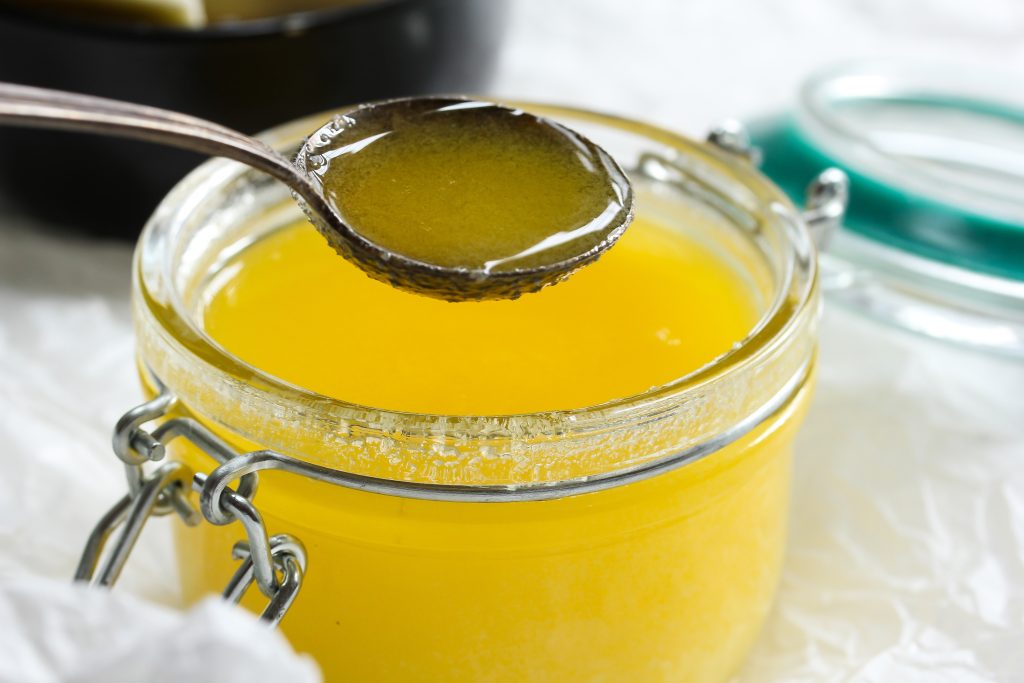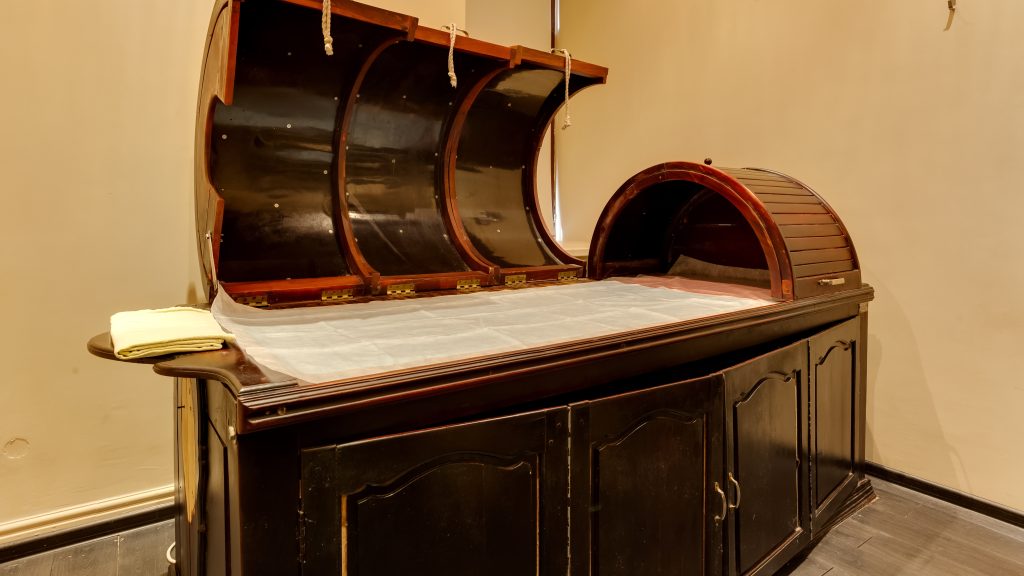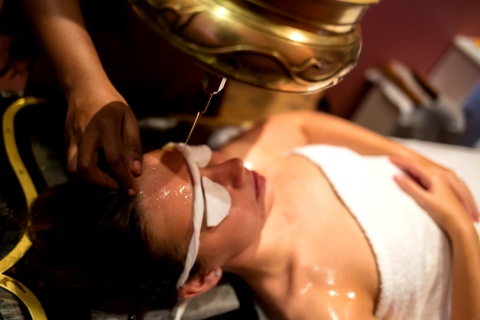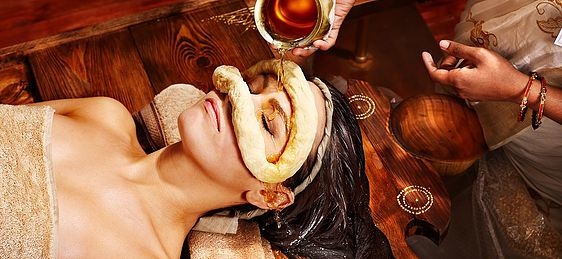Procedures
Ayurvedic treatment procedures at Atreya Ayurveda Clinic are performed under the supervision of our expert Ayurveda doctors. After an initial consultation, the doctor makes a diagnosis and prescribes treatment, which includes procedures, Ayurvedic medications, as well as recommendations on nutrition and lifestyle.
All the treatment procedures have a deep and strong effect on the body and mind; hence the involvement of a doctor is mandatory. Comprehensive cleansing of the body with natural Ayurvedic preparations facilitates healing and solves even the most complex health problems.
Panchakarma
Five therapies which meant for deep cleansing of the body

Panchakarma is the most complex purification method in Ayurveda which is executed by a series of therapies and is an individualized process that designed as per the requirement. A skilled and mindful team effort is essential for conducting a successful panchakarma procedure. Sensing the demand of body and fulfilling that in the most natural way is done through panchakarma.
The goal of Panchakarma is not only to remove toxins, but also to restore a healthy mind-body balance at all levels. It does rejuvenation of the whole body even at the cellular level.
Panchakarma consists of five main therapies or treatments. It does the removal of Ama (toxins) from the body safely and effectively. The duration of the cleansing program may vary depending on the condition of the patient.
Panchakarma plan for an individual includes special diet, the use of herbal formulations and supplements, treatment methods and lifestyle recommendations. Meditation, yoga and breathing exercises will greatly support the detoxification process.
Preparation for Panchakarma includes a number of procedures that help to remove accumulated Ama (toxins) from tissues. These initial treatments prepare the body for internal cleansing is called as poorva karma. The preparatory stages include:
- Deepana– the process of augmenting the metabolism is deepana. In this various herbal medicines are administered to increase the jataragni (digestive fire).
- Snehana (oleation) – in this stage of preparation, the body is undergoing through the process of oleation, which involves saturating the body with herbal fatty substances like ghee and oil. It can be done both in external and internal ways. The oil is selected specifically for the patient depends on the imbalance of a person’s dosha.
- Swedana – sudation therapy which does for induce sweating. Following the snehana, the fomentation is done through different methods like steam bath, hot water bath and in hot compress. The swedana procedure loosens the adhesion of toxins to the tissues and later it will easily expelled through the panchakarma.
Pradhaan karma- the panchakarma stage, consists of:
- Vaman is the emetic therapy. By the process of vamana, controlled bouts of vomiting is induced with herbal preparation. It is mainly suggested for the diseases caused by kapha dosha. Various skin conditions, infertility, obesity etc. are some of the common cases which get good result through Vamana.
- Virechanam is a natural cleansing process to induce controlled purgation. It cleanses the alimentary canal and is effective in pitta related diseases. Optimal function of various systems, especially organs like liver and gallbladder are obtained by virechanam.
- Vasti is the administration of complex of medicated enemas made from herbal decoctions and oils. It does the elimination of toxin when they reach the colon. It is considered as the best among the therapies given for vata dosha ailments. A large number of medicated enemas are explained in Ayurveda which are applicable to various autoimmune conditions and joint diseases.
- Nasya – administration of herbal medicines through the nostrils. Nasya can be done using medicated oil, ghee and juice of herbs. This treatment helps to remove toxins from the nasal passages, ears and eyes, cleanses and opens the channels of head, improving brain oxygenation, mental performance and enhances sensory perceptions.
- Rakta-moksha – bloodletting therapy. The process of bloodletting is an instant relief giver among the panchakarma. Symptoms like itching and burning sensations can be vanished immediately after the raktamokshana. Different methods of bloodletting practiced include jalauka (leech therapy), prachanam (pricking with needle) and siravyadha (venesection).
Snehapana
Snehapana is the intake of medicated ghee or oil. It is given in both modes- as a preparatory step for panchakarma and also as a shamana (pacifying) medicine. Ghee or oil enriched with medicinal herbs transfers the healing properties of herbal extracts dissolved in it to the body, which promotes healing. Drinking unctuous substances like oil and ghee has a positive effect on various types of allergies, immunological and metabolic disorders, arthritis, diseases of the skin, liver and gallbladder, intestines, nervous system, and chronic intoxication.

Procedure Sweda (Svedana)
Cost: INR.1000 | Duration: 15 minutes
Steam bath with herbal decoctions

Swedana (sudation) is done usually after Abhyanga (oil massage) lasting 60 minutes and a Bashpa steam barrel is given for 15-20 minutes.
Sudation therapy after a massage promotes active blood circulation, cleanses skin pores and removes toxic substances through sweat. The steam circulating inside the barrel is obtained from herbal combinations. Aromatic herbs are also used for generating the vapour. Medicinal herbs used for steam bath have beneficial effect on the body and contribute to the healing process.
MAIN INDICATIONS FOR THE SWEDAN PROCEDURE:
- Arthritis
- Osteochondrosis
- Fibromyalgia
- Excess weight and hyperlipidemia
- Spasms and pain
- Chronic fatigue
- Sleep disturbance
The total duration of the Swedana procedure including abhynaga is 75 minutes. People with injuries and some medical conditions should not undergo swedana. Consult our doctor before swedana.
Nasya
Cost: INR. 1700 | Duration: 45 minutes
Nasya is the procedure of administering herbal oils, decoctions or powders through the nostrils.
This procedure not only used as a cleansing therapy, but also to treat many serious diseases such as insomnia, loss of consciousness, stupor, hysteria, facial paralysis. Nasal administration of medications are recommended for dry nose, sinus blockages, migraines, diseases of the ear, throat and eyes, non-traumatic sprains of the muscles of the shoulder girdle, neck and back, and protrusions of the cervical spine. Simultaneous stimulation of the limbic system through the olfactory nerve can have powerful beneficial effects on mood, emotional state and memory. This is an intensive cleansing therapy that includes oil massages of the head and collar area. After the massage, the face and chest are steamed using medicated and aromatic herbs. Later special oils from herbs are administered into the nostrils. Then rinsing of throat is done by gargling with salt water or herbal decoction.

Nasya is contraindicated during menstruation and pregnancy. For an hour before and after Nasya, you should not eat or drink; you should avoid mental and physical stress. Exposing to cold wind, intake of cold water and cold food items after nasya is also contraindicated
Shirodhara
Cost: INR. 5000 | Duration: 1 hour
Amazingly calming therapeutic effect on the central nervous system and the body as a whole

Shirodhara is translated as “head” (shiro) and “continuous flow” (dhara). The procedure uses medicated oil, which is poured onto the forehead area of the “third eye” in a continuous rhythmic stream. We use the purest form of Ayurvedic medicinal oils!
Usually before Shirodhara you will recieve a relaxing neck and shoulder massage. Lukewarm oil is poured in a continuous stream onto your forehead to the “third eye” area from a special swinging bowl above your head. The effect of the procedure resembles meditation.
Medicated oils stimulate the brain centers that are responsible for the production of various neurotransmitters and hormones like endorphins – hormones of happiness. Shirodhara relaxes the farthest, deepest corners of the mind and body. Through the process of shirodhara the facial muscles relaxes, face becomes soften. Following the relaxation and revival of the whole body, there will be a feeling of harmony and peace.
The procedure will be effective for students and schoolchildren too, helping them with their studies. You can try this procedure in Atreya Ayurveda.
Kativasti
Cost: INR. 3000 | Duration: 30-40 minutes
Kati means lumbo-sacral area and during the Kativasti procedure, warm medicated oil is held on the spinal area using a closed barrier of specially prepared dough. It relieves lower back pain and stiffness. Highly effective in lumbar spondylitis and improves circulation of lower back. It is recommended for diseases of the spine and sexual disorders.

Payaseka
Cost: INR. 6000 | Duration: 1.5 hours

During the Seka procedure, a warm decoction of milk infused with Ayurvedic herbs is poured onto the patient’s body in a continuous stream. The Seka procedure is carried out over a course of 4 to 7 days as prescribed by a doctor.
This is an effective rejuvenating procedure. Payaseka helps with nervous exhaustion, debility, parachisis, diseases of bones and joints, diabetes and sexual weakness.
Pichu
Cost: INR. 2000 | Duration: 30 minutes
A cotton sponge soaked in warm oil is applied over a body part and is kept over a period of time. In between the procedure the oil is heated repeatedly to keep the temperature steady. Pichu is indicated for various diseases like headache, backache and cervical spondylosis. Shiropichu (pichu on scalp/head) is effective in insomnia and stress. The pichu procedure is recommended for rheumatic diseases and diseases of the nervous system.

Takradara
Cost: INR. 5000 | Duration: 60 minutes

Takradara is a soothing procedure that is similar in technology to Shirodhara. After a preparatory massage using herbal oil that matches your Dosha type, experts prepare a special fermented decoction, which is poured onto the forehead in the “third eye area.”
In Takradara, fermented buttermilk infused with herbal decoction is poured into a special bowl, which is placed above your head. The stream from the bowl is directly poured between the eyebrows and is slowly poured out with smooth oscillating movements from the right to the left temple region.
Typically, this procedure is prescribed in a course for a more pronounced effect and has a prolonged effect. Many of our patients note that after this procedure they feel rested and full of energy. And the procedure itself is similar to the process of meditation. Some patients relax so much that they fall asleep right on the massage table.
Indications: Takradara is indicated in skin conditions like scalp psoriasis. It is highly beneficial in psychosomatic diseases and insomnia. It gives good results in pediatric conditions like cerebral palsy. Takradara is one of the commonly practiced treatment modalities in motor neuron diseases.
Urovasti
Cost: INR. 2500 | Duration: 45 minutes
It is the retention of medicated oil in the uro (chest) region. In the procedure of Urovasti, a closed barrier is made with specially prepared dough and inside this warm oil is poured and retained for 45 minutes.
Urovasti treats asthma, respiratory diseases, heart disease, and pain in the chest muscles.

Kshira dhumam
Cost: INR. 2000 | Duration: 1 hour

Steam from a heated mixture of medicinal infusions and cow’s milk is directed through a tube onto the patient’s body or parts of the body. The nutritional value of milk is blended along with therapeutic properties of herbs and is used in treatments like facial paralysis, ptosis and various other nervous system diseases.
Talam
Cost: INR. 800 | Duration: 30 minutes
A special herbal powder mixed with medicinal oil is applied to the crown of the head. It kept for a particular time period and is wiped off. Talam is indicated in diseases of ear, nose and throat. It is also effective in insomnia and migraine.

Abhyanga
Cost: INR. 4500 | Duration: 60 minutes

Abhyanga is the classic oil massage, which is popular all over the world due to its healing properties and amazing sensations.
Classic massage is performed in four hands by two masseurs for 60 minutes. It is possible to achieve maximum relaxation and release of tension from the body through synchronized movements. According to Ayurvedic treatises, Abhyanga is a part of daily regimen (dinacharya) aimed at maintaining health.
During the massage, our expert therapists work all the muscles and joints of the body, saturating the skin and tissues with herbal oils with healing touch. Pressure and speed during massage, as well as oils, are selected in accordance with the individual constitution and condition of the body.
Helps in removing toxins, relaxes muscles, gives flexibility to joints and spine, tones and at the same time relaxes the body and mind, relieves stress and fills with energy.
Lepa
Cost: INR. 2500 | Duration: 15-30 minutes
The herbal paste application on the different parts of body is called lepa. Various herbal powders made into paste by mixing it with suitable adjuvant like oils, fermented fluids and juices. In some cases leaves are also made into paste to apply as lepa.
Lepa is applied for various types of inflammation, skin diseases, arthritis, gout, etc.

Podikizhi
Cost: INR. 4500 | Duration: 60mins

Podikizhi is a type of therapy with medicinal bags. To fill the bolus, medicinal herbs are cleaned, dried and ground into powder. The ingredients of the herbal powder vary depending on the course of the disease, the intensity of the pain, the predominance of the dosha and Prakriti of the patient. This herbal hot compress induced sweating of the body; hence it is classified under swedana procedure.
During the procedure, the bags are periodically heated in hot medicinal oil in a vessel. With the help of bags, the patient’s body is intensively massaged, rubbed and warmed up. This special technique with herbal powders relieves fatigue and stiffness. It is also an excellent skin exfoliant.
Shirovasti
Cost: INR. 5000 | Duration: 60 minutes
Luke warm medicated oil is allowed to stay on the patient’s head using a special high cap without a top. This is a procedure performed with utmost care to maintain sufficient temperature and to avoid oil leakage.
It is used for headaches, paralysis of the facial nerves, blurred vision, diseases of the cervical spine, etc. Shirovasti is useful for rehabilitation after strokes, dryness of the mucous membrane of the mouth, nose, headaches and other head diseases.

Yogavasti
Duration: 1.5 hours
Yogavasti is one of the main and commonly practiced procedures of Panchakarma. A course of eight enemas based on herbal decoctions and medicinal oil are administered.
Yogavasti is a course of Vasti (enema) procedure for eight days. It includes: three large enemas (Nirooha/Asthapana) based on herbal infusions and five small enemas (anuvasana/snehavasti) based on medicinal oil. In the large enema the quantity of medicine varies from 500ml to one litre and in small oil enema the quantity can be maximum up to 100ml.
The team of doctors and massage therapists are involved during the procedure. The doctor can give an enema himself, and massage therapists are mainly assistants in this procedure. At the beginning, you are given a massage and Bashpa (Sveda – steam procedure). Decoctions for enema are also prepared. The procedure lasts 45 – 60 minutes. The decocotion enema is generally given on an empty stomach, so it is recommended to do it before 10 am. The small oil enema-Anuvasana- is administered after the meals.
Tarpanam
Cost: INR. 3000 | Duration: 15-60 minutes

Therapeutic procedure for the eyes
A “frame” is carefully made surrounding the eyes using a special dough. It is then filled with medicated ghee or medicinal oil suitable for the condition. The medicine is allowed to stay for a time period.
Tarpanam is one of the very important therapies and its effect is very deep. It is prescribed as a course therapy where few treatments are mandatory before entering to the process of Tarpanam. The word Tarapanam means ‘to nourish’; by this treatment modality nourishment of the nerves and layers of eyes occurs. It is prescribed for the treatment of chronic and acute eye diseases. There are certain conditions where Tarpanam should not be performed; hence consult the doctor before planning for eye treatment.
Rasayana
Rasayana: An ancient Ayurvedic practice for longevity and well-being.
Rasayana is an ancient Ayurvedic practice which is considered one of the main methods of maintaining health and achieving longevity in traditional Indian medicine.
The word “Rasayana” comes from the Sanskrit word “rasa”, which means “essence” or “juice”, and “ayana”, which means “path” or “way”.
This method is designed to improve the quality and length of life and achieve a high level of physical and mental well-being. The first mentions of Rasayana appear in ancient Indian literature, including major Ayurvedic texts such as Charaka Samhita, Sushruta Samhita and Atri Samhita. These texts were written centuries ago and contain information about various aspects of Ayurvedic medicine, including Rasayana.

Rasayana is a comprehensive program that includes:
- Purification of body
- Special internal medications
- Healthy eating
- External therapies
- Yoga and meditation
- Other practices that help strengthen the body and mind
The main goal of Rasayana is to slow down the aging process, prevent the development of chronic diseases and ensure a high quality of life over time .
Rasayana helps:
- optimize body functions
- increases immunity
- improves memory and concentration
- strengthens the heart and blood vessels
- improves digestion
- relieves stress and promotes energy balance in the body
Although Rasayana is part of ancient Ayurvedic practice, it has also attracted scientific attention. A number of clinical studies show the effectiveness of exercise, diet and herbal remedies used in Rasayana in improving health and reducing the risk of developing cardiovascular disease, cancer and other chronic conditions.
Scientific publications have also noted the positive effects of meditation, yoga and other practices that are part of the Rasayana program on stress levels, depression and overall well-being in practitioners.
Another leg of Rasayana explained in Ayurveda text books is Achara rasayana. It mainly enhances the mental faculties thus preventing from the psychosomatic diseases. Various ideas to develop a good character and concepts to build a healthy society is there in topics of achara rasayana. Speaking truth, practicing non-violence, avoiding jealous and anger, indulging in activities to spiritual enlightment are some of the glimpses of achara rasayana.
Before starting the practice of Rasayana, you must consult with our Ayurveda Doctor, who will create an individual program suitable for your constitution type and health condition.